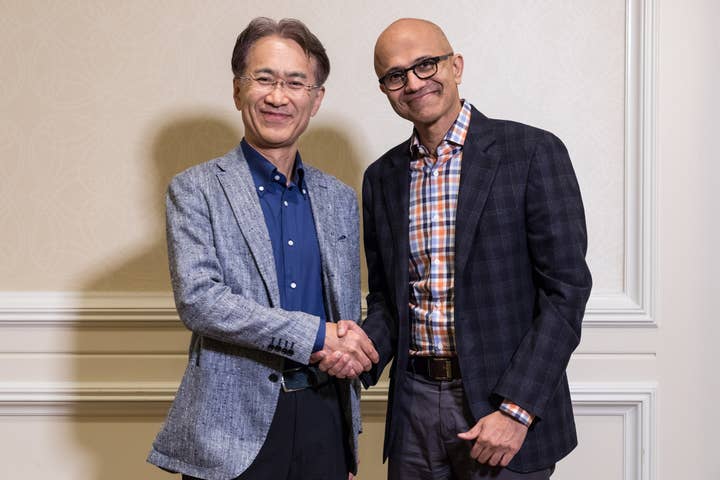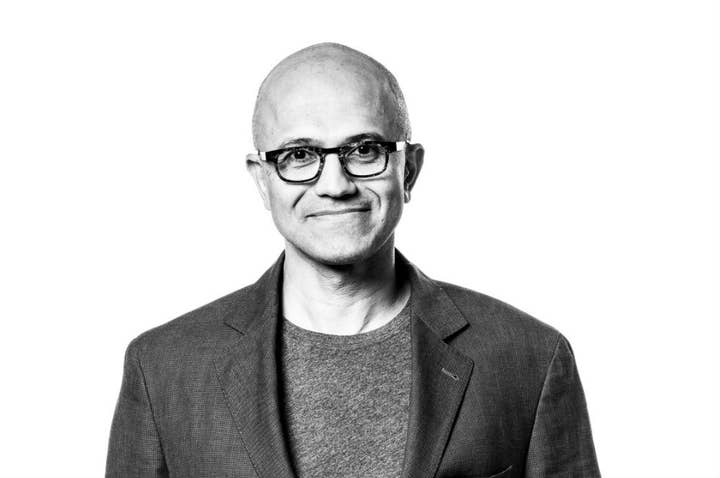Whoever wins the console wars of tomorrow, Microsoft will profit | Opinion
Satya Nadella sees a future where every game “platform” will ultimately run on Azure's infrastructure
When you hear talk of "tech giants" in the news, you've probably got a shortlist of the companies that spring to mind. Perhaps it's the "FAANGs" -- Facebook, Amazon, Apple, Netflix, Google. Perhaps you mentally add the likes of China's Tencent or Japan's Softabank to the list, or pencil in space for the likes of Tesla.
There's one giant, however, that's bigger than them all, and yet rarely gets mentioned in the same breath. There's only one trillion-dollar company in the world right now, and it's neither Amazon nor Apple (though they're both reasonably close to the line). As I write this, the only company valued at over a trillion dollars ($1.076 trillion, to be exact) is none other than Microsoft.
That valuation got a little bit of a boost this week from yet another incredibly solid earnings report. Almost everything the company is doing right now is a success; the Azure cloud platform is the most important driver of growth, but it's also seeing growth across plenty of other business segments, driven primarily by a smooth and well-managed transition of its core business software products into cloud services. Even LinkedIn, which the company acquired back in 2016, is doing remarkably well. It's not just about a single solid quarter, though. Microsoft's growth trajectory has been clear for some time, with CEO Satya Nadella's vision for the company -- and his capacity to actually execute it successfully -- turning out to be exactly what it needed.
The Xbox division isn't a particularly bright spot in this story right now, though much of that is attributable to the fact that Xbox is pretty much officially in its generational transition period right now. Xbox hardware sales are down almost 50% year-on-year, but Microsoft's commitment to gaming feels more solid now than it has at any point in the past few years.
"Microsoft's commitment to gaming feels more solid now than it has at any point in the past few years"
For a long time there was a certain odd-one-out quality to the Xbox. As Nadella turned the ship around to focus more closely on Azure and software-as-a-service offerings for business, it wasn't clear what role Xbox would play in the new Microsoft he envisioned. The failure of the Xbox One to effectively compete with PlayStation 4 wasn't set in stone when the device had a misguided launch. Sure, the early focus on cable TV and Kinect went down like a lead balloon, but the fact that Microsoft as a company was shifting focus in a way that left the future of Xbox looking uncertain also played a big, if less clearly defined, role. Too-early overtures about the power of the cloud were more designed to appeal to Microsoft's executives than to developers or consumers. Top-line software support for Xbox languished for several years, long after the launch gaffes of the console would easily have been forgiven in the face of a really great game line-up.
Now, though, Nadella clearly understands where he wants Xbox to fit into the picture and sees the division playing a valuable, important role in Microsoft's future. He talked in the call following the results about a "secular shift" in game consumption pushing in Microsoft's direction -- a reference to some extent to cloud streaming and computing services, but more meaningfully to the way that games are becoming a multi-platform experience that span across several different classes of device.
Nadella likes the idea of Microsoft sitting at the heart of that; or, to be precise, he likes the idea of Azure being the cloud platform that powers and mediates all of those different experiences. The Xbox brand is part of that, but Xbox is intrinsically something that's quite "core" in its appeal, much as PlayStation is. Nadella is talking about a far wider opportunity for Microsoft to become the Grand Central Station of infrastructure of all sorts of games, from the very core to the completely casual.

The role that Xbox plays in all of this, then, is as a very major application for Azure -- one that functions both as a cornerstone client for the company's own cloud services, and as a powerful piece of marketing that tells other companies where they should be focusing their cloud efforts. The cornerstone client aspect is important; all of the companies that are really major players in cloud services are also major consumers of their own services -- Amazon runs its retail and digital media operations on the infrastructure behind AWS, Google's services run on the infrastructure behind Google Cloud Platform, and Microsoft will run services like Office and Xbox on top of Azure.
"In this vision of the future, Xbox is absolutely secure as a game platform even if it can't top PlayStation's hardware sales"
The fact that improvements to the cloud platform infrastructure feed back into the rest of the business, and vice versa, is a key element that helps to keep these firms' cloud services ahead of competitors and financially stable -- not to mention being pretty reassuring for clients using those cloud systems. The best guarantee that your Azure-based products and services will be reliable is the knowledge that if something does go wrong, it'll impact Xbox, Office, LinkedIn and so on, making it pretty certain that every stop will be pulled out to fix whatever happens.
The fact that Sony is also going to work with Microsoft on cloud services for PlayStation is also a major part of the message from a gaming point of view, and it's something Nadella was quick to talk up. If both Microsoft and Sony rely on Azure for their video game cloud services, it'll take a hell of an argument to convince other game creators to look elsewhere.
In this vision of the future, Xbox is absolutely secure as a game platform even if it can't top PlayStation's hardware sales. For one thing, that distinction will become increasingly irrelevant as cloud infrastructure makes platforms increasingly thin (who's to say you won't be able to play Xbox "exclusives" on a PlayStation or a Nintendo platform by subscribing to an Xbox service, for example?). Moreover, who at Microsoft will really care as long as most of those "rival" platforms are ultimately connected back into their Azure infrastructure?
This is the kind of thinking that has propelled so much of Microsoft's success under Nadella -- a willingness to bury hatchets left, right and centre, putting their biggest and best software onto rival platforms, opening up their own platforms for competitors to use, learning a willingness to adopt best-of-breed solutions regardless of their provenance, and adopting a device agnostic, operating system agnostic way of viewing the competitive landscape even while working to improve their own devices and operating systems. In that way of thinking, "success" for Microsoft in gaming might look a lot less like "sell more Xbox consoles than PlayStations," and more like "who cares, as long as both Nintendo and Sony end up using Azure as their backend anyway."
That might not set the blood of the console fanboys pumping, but it looks like a hell of a smart play from a business perspective. One of the oldest investment adages states that the best thing to do during a gold rush isn't to become a prospector, it's to set up a shop selling picks and shovels to prospectors. Microsoft is setting itself, and its Xbox division, up in a way that ensures that no matter what happens to the competitive landscape of game platforms and publishers, it'll always be able to cash in regardless. No wonder the market thinks it's worth a trillion dollars.

